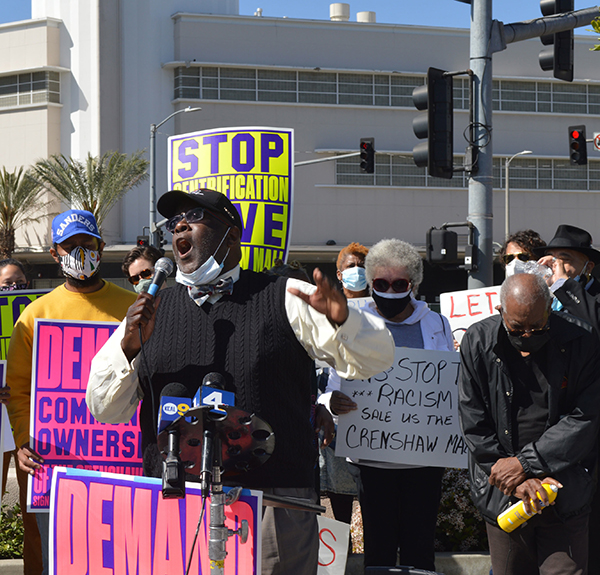Organization accuses bank of racism for refusing to discuss purchase of mall
Wave Staff Report
CRENSHAW — The leaders of the community effort to buy the Baldwin Hills Crenshaw Plaza upped the ante March 24 when they accused Deutsche Bank, the company hired by the malls owners to sell the property, of refusing to sell the shopping center to Black investors.
At a press conference held across the street from the shopping center, members of Downtown Crenshaw Rising accused the German-based bank of racism for refusing to acknowledge a bid of $28 million the organization had made for the mall.
“Backed by the best of community-friendly financial partners, we offered a higher bid and more generous terms than anyone,” said Niki Okuk, board chair of Downtown Crenshaw Rising board chair. “Yet we’ve been met with silence from Deutsche Bank’s Tim Ellsworth. To get anything out of them, we have to send white emissaries. It is disappointing and it’s a big mistake to think Black folks are going to take this lying down.”
Bank officials could not be reached for comment.
Downtown Crenshaw Rising is a group that was created in the past year when it was learned that a group with ties to then-President Donald Trump and his son-in-law Jared Kushner was trying to buy the mall that has been part of the community since 1947.
The mall is owned by a private equity firm invested in by over a half-dozen public pension funds, including the Los Angeles County Employee Retirement Association, the UC Board of Regents, Texas Teachers, New York City Teachers and the New York City Employees Retirement System.
Deutsche Bank has been hired to negotiate the purchase.
“Through Downtown Crenshaw, we are displaying to the world that it is possible for Black people to collectively control Black spaces, beat outside gentrifiers and create a new, more just model of redevelopment that uplifts communities like Crenshaw without uprooting long-time residents and merchants,” said Damien Goodmon, a board member of Downtown Crenshaw Rising. “We understand this is a threat to gentrifiers and bankers whose entire business model is based on displacing marginalized residents and locally revered mom-and-pop businesses.
“We just hoped the sellers of the mall would take our money, get out of the way of Black self-determination and maybe even see this as an opportunity to show that there is a better way.”
The Downtown Crenshaw Rising group has secured letters of interest for as much as $37 million from donors and values-aligned investors to support its bid to buy the mall. Financial backers include local black celebrities and philanthropists such as the Kataly Foundation, Regan Pritzker, Disney family members, Resource Generation LA, Kat Taylor, and more than150 other donors.
The goal is to build a democratic economy in Crenshaw that uplifts the Black community and addresses systemic challenges and inequities.
The group reportedly sent a letter to U.S. Rep. Maxine Waters, chair of the House Financial Services Committee. asking her to work with Downtown Crenshaw Rising leaders “to remove the racially restrictive covenant that Deutsche Bank has placed on the Crenshaw Mall.”
“We will not allow the overt institutional racism by Deutsche Bank to continue on our Crenshaw Mall or anywhere,” said Rev. William Smart Jr, of the Southern Christian Leadership Conference’s Greater Southern California chapter.
The Downtown Crenshaw Rising plan for the mall involves stabilizing the small businesses owned by merchants of color and create the community’s vision of a 21st-century modern urban village that is based on building community wealth, including affordable housing for residents, an advanced production studio space, urban gardens, an park of at least six acres, business incubation space and sit-down restaurants.
The organization also seeks to execute an environmental plan that would form a new higher standard for green development in an urban community.
All of the goals sought by the Downtown Crenshaw Rising would be developed by established and reputable developers while under the control of the community’s nonprofit.
At least two efforts to close the sale of the shopping center have failed in the past year.
Wave intern Taylor Goodson contributed to this story.











